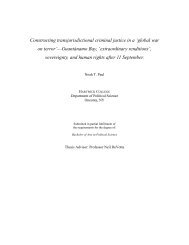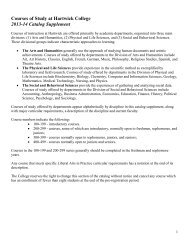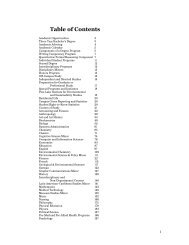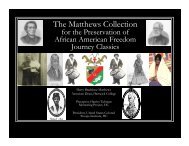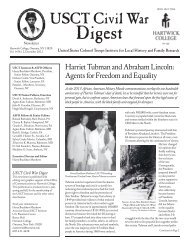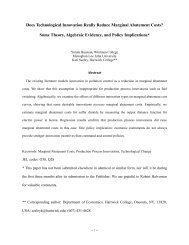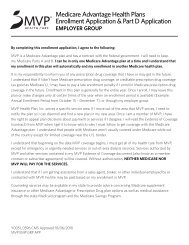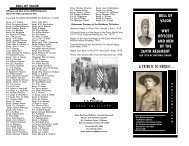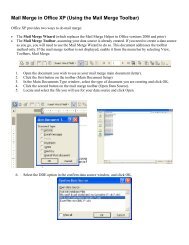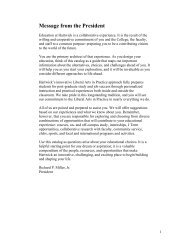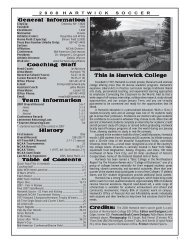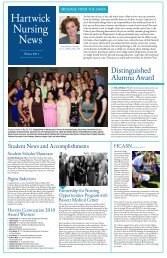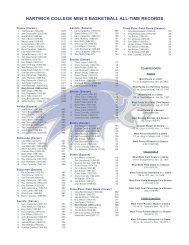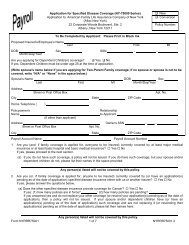Table of Contents - Hartwick College
Table of Contents - Hartwick College
Table of Contents - Hartwick College
Create successful ePaper yourself
Turn your PDF publications into a flip-book with our unique Google optimized e-Paper software.
political system. The course also will draw comparisons with the shift<br />
from slave to free labor in other societies, including Haiti, Jamaica, Cuba,<br />
and Brazil.<br />
341 Civil Rights Seminar (4 credits) After considering the social,<br />
economic, and political conditions <strong>of</strong> African Americans in the South and<br />
North in the late 19 th and early 20 th centuries, students examine the Civil<br />
Rights Movement in the mid-20 th century. Besides analyzing roles and<br />
changing images <strong>of</strong> the leaders, for example, the Reverend Dr. Martin<br />
Luther King Jr., students seek to learn more about the lives and actions<br />
and voices <strong>of</strong> ordinary people, black and white, swept up in the currents <strong>of</strong><br />
the Civil Rights Movement, through oral histories and autobiographies.<br />
Students also analyze the Black Power Movement and changes in the<br />
images <strong>of</strong> Black men and women in the media and public life. For the<br />
major paper, students conduct original, primary research on the history <strong>of</strong><br />
discrimination in their home communities.<br />
342 U.S. History after the Bomb (4 credits) Focuses on three themes:<br />
1) How “we” (U.S./nation and each <strong>of</strong> us personally) define security; 2)<br />
U.S. as a Global “Superpower” and 3) Bringing Others into the Fold: Race,<br />
Ethnicity, Class, and Gender in the Post-Bomb Years. Students analyze<br />
these themes through textbook readings, autobiographical accounts,<br />
historiography, primary documents, documentaries, and movies. Also,<br />
given the course title, “After the Bomb!”—students discuss how the threat<br />
<strong>of</strong> nuclear war has influenced political, social, and economic life in the<br />
U.S.<br />
350 Advanced Topics in History (4 credits) From time to time the<br />
department will <strong>of</strong>fer advanced courses in particular topics in history.<br />
Students may elect Hist 350 more than once, provided they do not repeat<br />
the same topic.<br />
361 European Imperialism (4 credits) This advanced seminar will<br />
examine the interaction between Europeans, Africans and Asians from<br />
1750 to the present. Issues addressed will include the European use <strong>of</strong><br />
science and religion to justify their rule over other societies; how the<br />
culture <strong>of</strong> imperialism shaped perceptions <strong>of</strong> gender and race; how<br />
certain Indian and African nationalists argued against imperial rule; and<br />
the challenges <strong>of</strong> the post-colonial era. Because <strong>of</strong> the scope <strong>of</strong> the subject,<br />
a substantial portion <strong>of</strong> the course will focus on British and French<br />
imperialism in Africa and India from 1850 to 1970. Prerequisites: HIST<br />
212, 213, 261, or 266; or permission <strong>of</strong> the instructor. (WHS)<br />
362 Becoming National (4 credits) Students will survey the<br />
development <strong>of</strong> the nation as a modern cultural identity and the<br />
foundation for appropriate political association and representation. The<br />
course will consider the pre-modern forms <strong>of</strong> cultural identity and<br />
political organization to emphasize the relatively recent historical<br />
appearance <strong>of</strong> the nation in political discourse. The readings will<br />
juxtapose this European model on the colonial and post-colonial worlds.<br />
Finally, the students will consider the political alternatives for nations as<br />
viable political<br />
agents in the 21 st world. Prerequisite: a global history survey (Hist 160-9).<br />
376 Issues in Indian Country Today (4 credits) A seminar-format<br />
course in which the class will examine a series <strong>of</strong> selected topics relating<br />
to modern Native Americans—examining each topic for its present status,<br />
151



